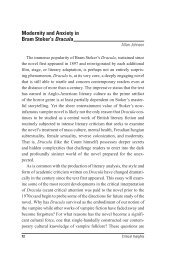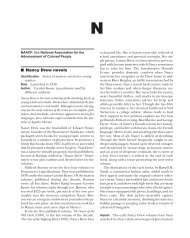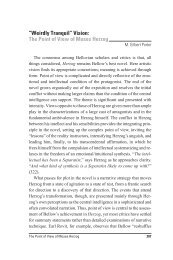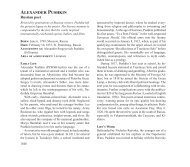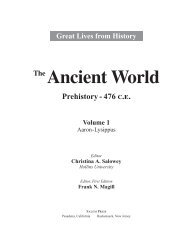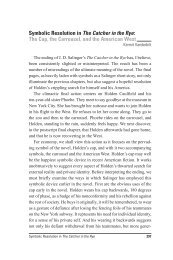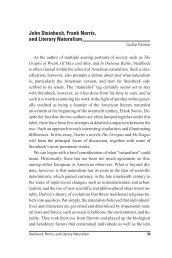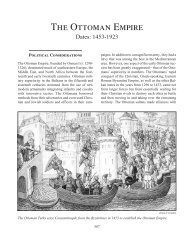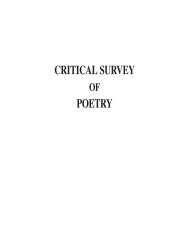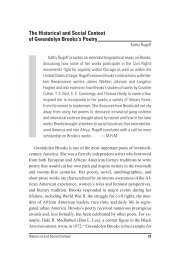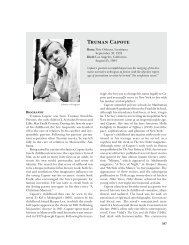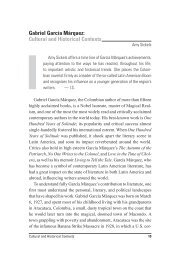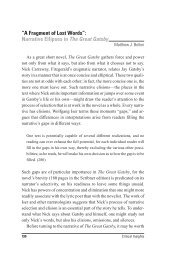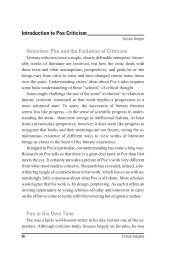Heracles's twelve labors - Salem Press
Heracles's twelve labors - Salem Press
Heracles's twelve labors - Salem Press
You also want an ePaper? Increase the reach of your titles
YUMPU automatically turns print PDFs into web optimized ePapers that Google loves.
Heracles’s Twelve Labors │ 79<br />
with the tail of a dragon that guards the gates. Many<br />
figures in Greek mythology attempt to enter the realm of<br />
the dead, but very few successfully return to the world<br />
of the living. In entering this realm, Heracles confronts<br />
the greatest power in the chthonic realm and proves that<br />
he, like the Olympian gods, is unaffected by this danger.<br />
This is the true divide between the chthonic and the<br />
Olympian: it is not that the Olympian gods are reborn after<br />
death but rather that they do not die. Likewise, even<br />
if a hero is memorialized in temples and worshipped at<br />
festivals, he still faces a mortal death and is still sent to<br />
the underworld. Heracles overcomes this threat, traveling<br />
with the secrets of the Eleusinian cult and wrestling<br />
Cerberus. Heracles’s triumph over Cerberus suggests<br />
that even were he to find himself in Hades with the other<br />
mortal heroes, he would not be contained there, as his<br />
might is such that he could win his freedom at any time.<br />
To heighten this contrast, he comes across Theseus, the<br />
legendary chthonic hero and founder of Athens, who,<br />
unlike Heracles, is unable to escape the underworld.<br />
His <strong>labors</strong> complete, Heracles is free to go on to other<br />
adventures with the promise from the oracle that he will<br />
one day become immortal. Indeed, in later legends, his<br />
earthly body is destroyed in a funeral pyre he built himself,<br />
while his godly form rises to the immortal realm<br />
of the Olympians. However, the <strong>labors</strong> of Heracles<br />
themselves end long before he meets this destiny. The<br />
<strong>labors</strong>, then, are not about the existence Heracles will<br />
share on Mount Olympus, nor are they about immortality<br />
and godliness, even as those rewards drive the story<br />
from the start. Instead, the myth of the <strong>labors</strong> is about<br />
the triumph of Greek civilization over the untamed and<br />
often frightening natural world. Heracles is the greatest<br />
hero to come out of antiquity, a legend born in the<br />
chthonic realm. His greatest feat, however, is not simply<br />
his brutish triumph over beasts and monsters. Rather,<br />
his glory is the glory of all Greece, of the earth and of<br />
the gods. In directing sacrifices to Zeus and obeying the<br />
command of the oracle of Delphi, Heracles offers the<br />
devotion and respect expected from the chthonic realm.<br />
Paradoxical as it may seem, it is by becoming an ideal<br />
of chthonic life that Heracles is elevated at last to the<br />
Olympian realm, indicating that perhaps the two realms<br />
are not be as separate as they seem.<br />
Cross-Cultural Influence<br />
The ancient Greek Heracles was the pinnacle of the<br />
masculine hero, capable of conquering entire armies<br />
and slaughtering ferocious beasts. He fathered children<br />
with nearly a hundred women, traveled to the ends of<br />
the earth, and defended the entirety of Greek civilization<br />
on many occasions. However, the heights of Greek<br />
masculinity do not match up neatly with modern ideas<br />
of masculinity. The ancient Heracles was also a playful<br />
figure, enjoying leisurely games and spending time<br />
with his children when possible. In addition to his many<br />
wives, he took on countless male lovers to whom he<br />
expressed passionate, unabashed romantic love. In the<br />
ancient context, these qualities made him even more heroic<br />
and masculine, even if they seem incongruous with<br />
contemporary ideals of masculinity and heroism.<br />
Primarily because of his role as the ultimate hero,<br />
the myths surrounding Heracles have had a significant<br />
legacy through the modern day. Countless European<br />
and American films revisit the Heracles story, including<br />
the 1997 animated Disney musical Hercules and a long<br />
series of popular Italian adventure films from the midtwentieth<br />
century. Comic books, theatrical productions,<br />
and television series have also regularly featured Heracles.<br />
Almost without exception, however, these portrayals<br />
focus on a version of Heracles who fits comfortably<br />
into modern ideas of masculinity. He is presented as a<br />
stern or angry figure, quick to fight and lacking the playfulness<br />
and romanticism of the Greek myths. While he<br />
may rescue endangered strangers, as he does in the ancient<br />
stories of the <strong>twelve</strong> <strong>labors</strong>, the modern Heracles<br />
rarely falls in love with those strangers and even more<br />
rarely has his heart broken by them.<br />
One of the few contemporary exceptions to these<br />
portrayals is found in the book Autobiography of Red<br />
(1998) by the Canadian-born poet and classicist Anne<br />
Carson. A novel written in verse fragments, the work is<br />
a retelling of the tenth labor of Heracles, during which<br />
he battles the monster Geryon. Carson takes some inspiration<br />
from the ancient poet Stesichorus (Stesichoros),<br />
whose long poem Geryoneis tells the myth from Geryon’s<br />
perspective. While the Geryoneis is largely lost to<br />
time, existing only in a few fragments of text, those fragments<br />
inspired Carson to create a modern version of the<br />
myth that likewise tells the story from Geryon’s point of<br />
view. However, while the Geryoneis focuses on the violence<br />
of Heracles arriving at Erythea, the island where<br />
Geryon resides, and killing the supposedly immortal<br />
monster with a poisoned arrow, Carson instead imagines<br />
Geryon and Herakles (in her spelling) as young lovers,<br />
with Herakles abandoning Geryon and breaking his<br />
heart. In presenting Herakles as causing emotional rather<br />
than physical violence, Carson focuses the reader’s<br />
MYTHHERO_Book.indb 79<br />
8/20/2013 2:14:02 PM



